Nearly all U.S. adults say it is important to have a president who lives a moral and ethical life, and almost half say it’s important for the president to have strong religious beliefs.
While fewer Americans want a president who shares their religion, most do want a president who stands up for people with their religious beliefs. We asked respondents their views about three candidates competing ahead of the 2024 presidential election: Democratic President Joe Biden, former Republican President Donald Trump and Republican challenger Nikki Haley.
(We asked these questions in February 2024 before Haley ended her candidacy. Go to the Topline for views about Haley.)
- 13% of U.S. adults say they think Biden is “very” religious, while 41% say he is “somewhat” religious and 44% say he is “not too” or “not at all” religious.
- 4% think Trump is “very” religious, while 25% describe him as “somewhat” religious and 68% say he is “not too” or “not at all” religious.
- Fewer than half of Americans say Biden or Trump stand up for people with their religious beliefs at least “some,” though responses on this question vary a lot by religious and political affiliations.
- Republicans and Democrats are highly polarized in their opinions of Biden and Trump, as well as how they evaluate these candidates’ religious engagement. These deep divides are often reflected in religious subgroups. For example, White evangelical Protestants view Trump more favorably than do people in other religious groups, while Black Protestants, Jews and atheists are more positive than many others about Biden.
How favorably do Americans view Biden and Trump?
More than half of Americans overall express unfavorable views of Biden (62%) and Trump (60%). This has been the case on all four surveys asking about these candidates since July 2022.
Majorities of Black Protestants (66%), Jews (62%) and atheists (59%) rate Biden favorably. White evangelical Protestants (14%) are less likely than the other religious groups in this analysis to express a positive view of the current president.
The opposite pattern plays out in views of Trump. White evangelical Protestants (67%) are the most likely to hold favorable views of Trump, while far fewer Black Protestants (17%) and Jews (21%) take this stance. And 25% of religiously unaffiliated adults, including just 12% of atheists, view Trump favorably.
Generally, Republicans (and Republican leaners) and Democrats (and Democratic leaners) express much more favorable views of the candidates that represent their own party.
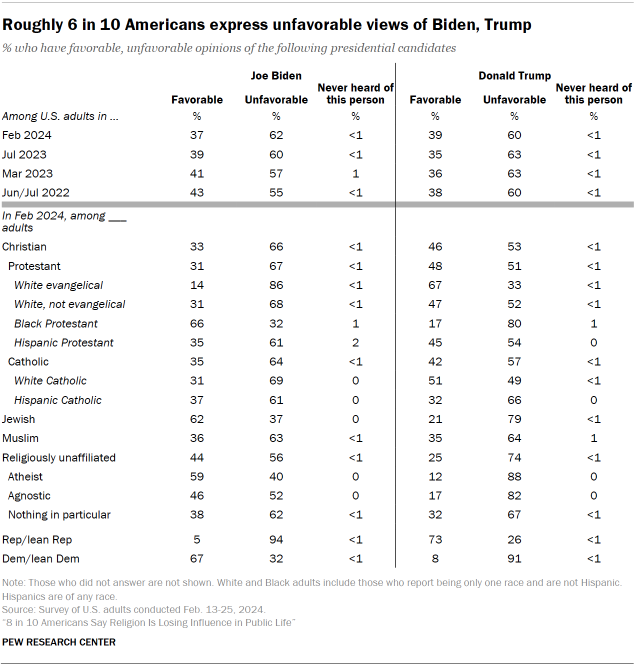
How much do religion and morals matter in a president?
As we did ahead of the 2020 presidential election, we asked Americans what moral or religious qualities they seek in a president.
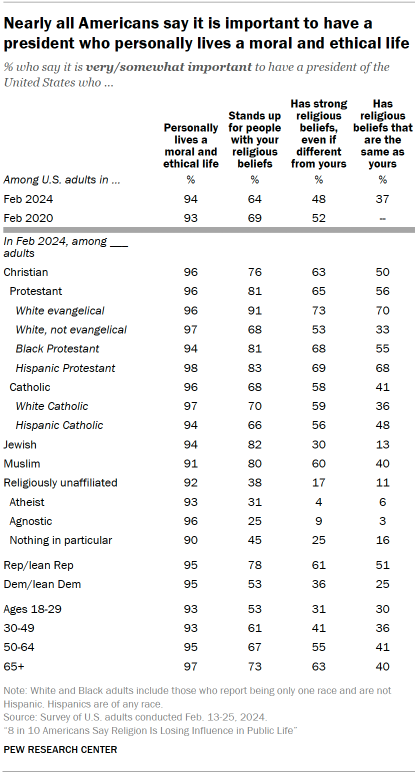
Once again, U.S. adults are far more likely to say they want a president who personally lives a moral and ethical life than to say the president should possess certain religious traits.
That said, many Americans still seek a president who engages with religion in various ways.
Almost all Americans (94%) say it is at least somewhat important to have a president who personally lives a moral and ethical life. There are no big differences on this question by religious affiliation, partisanship or age.
Fewer Americans – but still a majority (64%) – say it is at least somewhat important to have a president who stands up for people with their religious beliefs.
Close to half (48%) say it is at least somewhat important that the president has strong religious beliefs, even if these beliefs are different from their own. And 37% of U.S. adults say it is important to have a president with the same religious beliefs as their own.
White evangelical Protestants are among the most likely to say it is at least somewhat important to have a president who stands up for people with their religious beliefs (91%), has strong religious beliefs (73%), and has the same religious beliefs as their own (70%).
Black Protestants and Hispanic Protestants also generally value all of these religious attributes in a president more than other religiously affiliated Americans.
And while few Jewish Americans say it is important to have a president who shares their religious beliefs, the vast majority think it is at least somewhat important for the president to stand up for people with their religious beliefs (82%).
Republicans are far more likely than Democrats to prioritize the religious qualities we asked about. For example, Republicans are about twice as likely as Democrats to say it is important that the president has the same religious beliefs as their own (51% vs. 25%).
Older U.S. adults are also generally more likely than younger Americans to value religious engagement by the president. For example, U.S. adults ages 65 and older are about twice as likely as those ages 18 to 29 to say it is important to have a president with strong religious beliefs (63% vs. 31%).
How religious are Biden and Trump?
Roughly two-thirds of U.S. adults (68%) say Trump is “not too” or “not at all” religious. Just three-in-ten say Trump is “very” (4%) or “somewhat” (25%) religious.
By contrast, a slight majority of Americans view Biden as either very (13%) or somewhat (41%) religious. This is 10 percentage points lower than when we last asked this question in March 2021, but still higher than the share who say the same about Trump.
Compared with most other religious groups, Black Protestants are especially likely to view Biden as at least somewhat religious. By contrast, 70% of White evangelical Protestants say Biden is not too or not at all religious; a similar share of Republicans and Republican-leaning independents say the same (69%).
White evangelical Protestants and Republicans are more likely than other U.S. adults to view Trump as at least somewhat religious. Still, about half of White evangelicals (49%) and Republicans (48%) say Trump is not too or not at all religious.
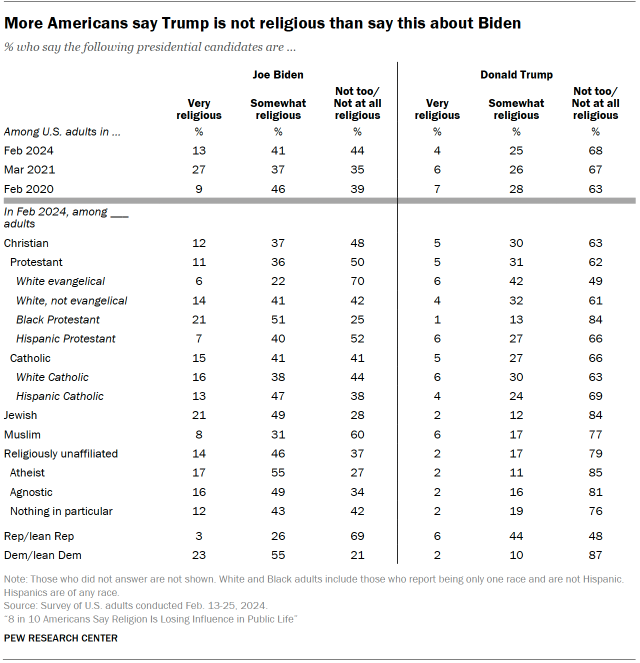
How much do Americans think candidates stand up for people with their religious beliefs?
While nearly two-thirds of Americans (64%) say it is at least somewhat important to have a president who stands up for people with their religious beliefs, just 40% say Biden does this “a great deal,” “quite a bit” or “some.” A similar share (38%) says this about Trump.
Jews (73%) and Black Protestants (60%) – two predominantly Democratic constituencies – are more likely than other groups in this analysis to say that Biden stands up for people with their religious beliefs at least “some.”
Only about a quarter of White evangelical Protestants (24%) say Biden stands up for people with their beliefs at least some.
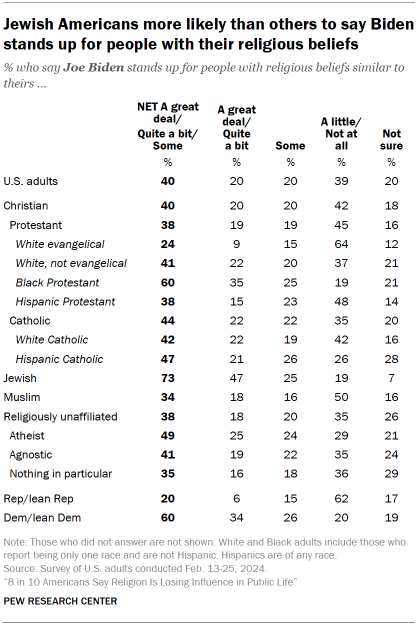
Conversely, White evangelical Protestants are much more likely than other groups to say Trump stands up for people with their religious beliefs: 49% say Trump does this a great deal or quite a bit, while 20% say Trump does this some.
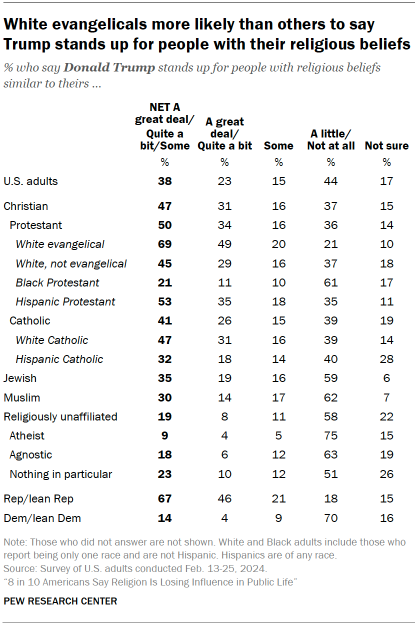
Muslims, Black Protestants, Jews and religiously unaffiliated Americans are more likely to take the opposite view of the former president. Majorities in these groups say Trump stands up for people with their beliefs “a little” or “not at all.”
Few Republicans say Biden stands up for people with their religious beliefs quite a bit or a great deal. And few Democrats say Trump stands up for people with their religious beliefs.




